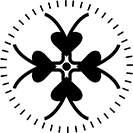Module Four
Introduction to the World View of Indigenous Africans and Their Spiritual Practices
Presented by Vella Maseko and Nompumelelo Prudence Kubeka

Image Credit: Carl Jung, Illustration from The Red Book: Liber Novus, page 125.
Description
The purpose of the module is to develop a deeper understanding of Indigenous African people’s world view and how that might have a bearing on how they deal with life events or processes of life from birth, marriages, coming of age, death, and grief. In this module we will explore some of the core beliefs and healing modalities of Indigenous Africans.
Seminar Dates
- May 25 – Understanding Indigenous Healing and Ancestral Calling
- June 1 – Different Types of Ancestors and Ukuthwasa
- June 8 – Different Types of Traditional Healers and the Witchcraft Suppression Act
- June 15 – Umuntu (human being): Four parts – Body, Soul, Mind and Self; What is death?
Seminar Content
May 25 – Understanding Indigenous Healing and Ancestral Calling
During this seminar the following key tenets of the beliefs of abantu will be discussed:
- Umoya (Spirit)
- Umvelinqangi/Qamata
- The relationship between ancestors and the living
- Interdependence and inter-connection of all life forms
June 1 – Different Types of Ancestors and Ukuthwasa
In this seminar the developmental process of the soul from an Indigenous African perspective will be explored. We will also explore the process of training a healer, i.e. Ukuthwasa, and further discuss different types of ancestors or spirit guides.
- Different types of ancestors
- Ukuthwasa (spiritual awakening), signs or symptoms of Ukuthwasa
June 8 – Different Types of Traditional Healers and the Witchcraft Suppression Act
This seminar explores the impact that the South African history of colonialism and apartheid has had in transforming Indigenous beliefs and spiritual practices. A special interest will be focused on the Witchcraft Suppression Act of 1953. We will look into the types of healers that are commonly found in present-day South Africa.
- Different types of traditional healers
- Witchcraft Suppression Act
June 15 – Umuntu (human being): Four parts – Body, Soul, Mind and Self; What is death?
This seminar explores the Indigenous African view of umuntu – a human being – as comprising four interrelated parts: body, soul, mind, and self.
Module Reading List
Recommended Reading
- Thembelihle Zuma, Daniel Wright, Tamsen Rochat and Mosa Moshabela. “The Role of traditional health practitioners in Rural KwaZulu-Natal, South Africa; generic or mode specific?” BMC Complementary and Alternative Medicine, 2016; 16: 304. [Available here]
- Mbatha Nompumelelo, Exnevia Gomo, Nceba Gqaleni and Mlungisi Ngcobo. “Core competencies acquired in indigenous training of traditional health practitioners in KwaZulu-Natal”. African Health Sciences (December 2019), 19(4):3100-3106. [Available here]
- Harry Joseph Aponte (2022). The Soul of Therapy: The Therapist’s Use of Self in the Therapeutic Relationship. Contemporary Family Therapy, 44(2):136-143
Module Presenters
Vella Maseko is an Indigenous Healer as well as a Clinical Psychologist in private practice. She is based at Vista Psychiatric Clinic in Centurion in Tshwane (Pretoria). She received her calling to become a healer in her internship year of the Master’s Degree in Clinical Psychology at the University of the Witwatersrand in 2004.
After completing her internship at Baragwanath Hospital and Charlotte Maxeke Hospital she had to put her studies and practice in psychology on hold due to illnesses related to Ukuthwasa.
From 2005 to 2007 she worked mainly as a facilitator and trainer. Some of the companies she worked for were MOA (Pty) Ltd where she conducted healing workshops in areas which were gutted by political violence in the 1990’s like Boipatong and Sharpeville. She also served as a consultant in a Faith Based Advisory Committee at Freedom Park Trust during the construction of Freedom Park Heritage Site in Pretoria.
Vella was initiated and completed her training as Isangoma in 2007. In 2010 she completed her initiation into being an Igqirha (Xhosa spiritual healer) as well as Umthandazi (Faith Healer). She has been working as a Traditional Health practitioner as well a Clinical Psychologist in private practice for more than 13 years. Since 2018 Vella has been involved in a series of dialogues between Traditional Healers and Jungian Psychoanalysts who belong to the South African Association of Jungian Analysts (SAAJA). She also facilitates seminars and workshops on African Spirituality and Psychology.
Nompumelelo Prudence Kubeka is a Traditional Healer and Clinical Psychologist in private practice. Her Practice is called NPK Clinical Psychologist and it is based in Mondeor (Johannesburg). She is also a sessional psychologist at Akeso psychiatric clinic in Alberton.
Nompumelelo incorporates her work of being a traditional healer and a psychologist in her practice and adheres to the HPCSA scope of practice. She completed her magister in 2016 at University of Pretoria. After her internship at Weskoppies Psychiatric hospital, she worked at the Chris Hani Baragwanath Academic hospital as clinical psychologist.
While completing her magister and internship at Weskoppies Psychiatric hospital, she was trained in traditional healing and graduated in 2016 as a traditional healer. Her thesis The Psychological Perspective on Zulu Ancestral Calling: A Phenomenological Study (2016, UP, Pretoria), written while she was undergoing her process, is based on her understanding of and submission to the ancestral calling.
Her work includes psychotherapy, teaching and supervising on the value of indigenous healing, African rituals and culture to professionals in universities and academic hospitals, to promote an understanding of patients especially those with ancestral calling.
